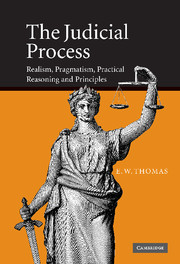Book contents
- Frontmatter
- Contents
- Preface
- 1 Introduction
- 2 Muddling along
- 3 The ‘curse’ of formalism
- 4 Legal fundamentalism
- 5 The idolatry of certainty
- 6 The piety of precedent
- 7 The foibles of precedent – a case study
- 8 There is no impersonal law
- 9 So, what is the law?
- 10 The constraints on the judiciary
- 11 Towards a new judicial methodology
- 12 Of realism and pragmatism
- 13 Of … practical reasoning and principles
- 14 Taking law seriously
- 15 A theory of ameliorative justice
- Subject index
- Authors index
10 - The constraints on the judiciary
Published online by Cambridge University Press: 15 July 2009
- Frontmatter
- Contents
- Preface
- 1 Introduction
- 2 Muddling along
- 3 The ‘curse’ of formalism
- 4 Legal fundamentalism
- 5 The idolatry of certainty
- 6 The piety of precedent
- 7 The foibles of precedent – a case study
- 8 There is no impersonal law
- 9 So, what is the law?
- 10 The constraints on the judiciary
- 11 Towards a new judicial methodology
- 12 Of realism and pragmatism
- 13 Of … practical reasoning and principles
- 14 Taking law seriously
- 15 A theory of ameliorative justice
- Subject index
- Authors index
Summary
The significance of judicial constraints
Democratic imperatives require the power of the three arms of government to be constrained. Indeed, the constraints are the essence of the constitutional framework of a democracy and the rule of law. In broad terms, the legislative branch is constrained by elections and such structures as Parliament puts in place to permit it to monitor the legislative process. The executive branch is not elected, but is constrained by the terms and purpose of its empowering statutes, parliamentary supervision, internal control mechanisms and judicial review in the courts. Judges are neither elected nor supervised, judicial independence being a fundamental tenet of the constitution. But to conclude from this apparent freedom that the judiciary is unconstrained is misleading. Judges are subject to a wide range of effective constraints. The depiction of the errant or aberrant judge kicking over the traces and subverting the democratic process or the rule of law is indicative of an obsessional fear of judicial discretion or judicial autonomy.
Critics of judicial autonomy, of course, seek to do more than curb the errant or aberrant judge. They seek to eliminate judicial initiative and creativity and thus confine the judge's law-making power to the barest minimum. The constraints do not achieve this objective. Nor should they. There must be room in the law for the bold and the timorous, the progressive and the cautious, the liberal and the conservative, and a host in-between.
Information
- Type
- Chapter
- Information
- The Judicial ProcessRealism, Pragmatism, Practical Reasoning and Principles, pp. 241 - 269Publisher: Cambridge University PressPrint publication year: 2005
